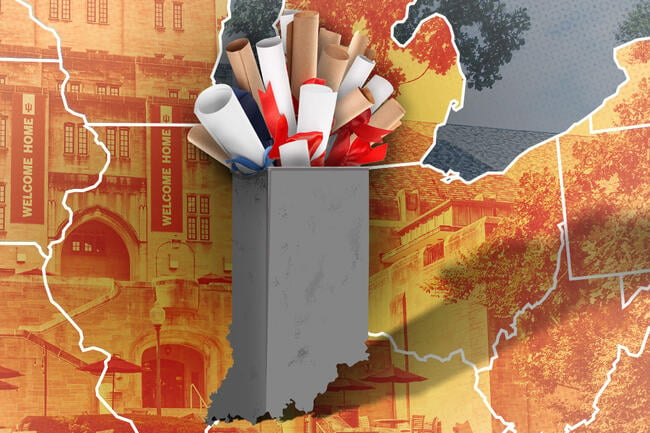You have /5 articles left.
Sign up for a free account or log in.

An Indiana state agency says institutions are “voluntarily” cutting or merging over 400 programs.
Photo illustration by Justin Morrison/Inside Higher Ed | Liudmila Chernetska and Nicholas Klein/iStock/Getty Images
Indiana’s public higher education institutions plan to eliminate or consolidate over 400 programs, equaling roughly one-fifth of their degree offerings statewide, the Indiana Commission for Higher Education said Monday. The announcement came just before a new state law took effect Tuesday setting minimum requirements for how many graduates individual programs must produce at the universities and Ivy Tech Community College, or face termination.
Republican state legislators passed the law—a state budget bill with major higher education provisions tacked on—less than two days after revealing it in April. It says institutions can ask the commission for approval to keep offering degrees that don’t meet the threshold of average annual graduates. But the universities “voluntarily submitted” the first wave of hundreds of programs to be ended or consolidated, the commission said, meaning they didn’t ask for exemptions.
According to a list posted by the commission, among the 400 degrees to be nixed or combined into others are many foreign language and teacher-education programs. The list also includes undergraduate and graduate degrees in fine arts, English, business, economics, philosophy, history, anthropology, sociology, journalism, public administration, social work, labor studies, political science, American studies, Africana studies, women’s and gender studies, religious studies, and classical studies.
STEM and medical disciplines aren’t being spared, either; the eliminated or consolidated degrees include some in health, biology, chemistry, math, computer science, computer engineering, electrical engineering and mechanical engineering. Indiana University at Bloomington, for instance, is ending its Ph.D. in astrophysics. More than half the programs to be eliminated or merged are in the IU system. Vincennes University is the only public institution in the state that didn’t “voluntarily” submit programs to be cut or combined.
The law’s threshold for associate degree programs is graduating an average of 10 students annually over the past three years. The threshold is 15 students for bachelor’s degree programs, seven for master’s degree programs and three each for education specialist programs and doctorate programs.
Indiana’s program slashing can be seen as another consequence of the broader push by red states’ legislatures to intervene in higher education by restricting teaching, attacking tenure and, now, dictating curricula. But the fact that Indiana’s public universities are taking the opportunity to reduce degree offerings without seeking the exceptions allowed by law may indicate that they, like public institutions in other states, want to pare down programs themselves for what may be financial, academic, political or other reasons.
Faculty are not pleased.
“This is sort of devastation wrought upon IU, both the flagship campus and the regionals,” said Benjamin Balthaser, secretary-treasurer of IU South Bend’s campus chapter of the American Association of University Professors.
Heather Akou, the president-elect of the IU Bloomington Faculty Council, said the council didn’t get to vote on these “draconian” cuts and mergers at the flagship campus.
“Not only did we not vote, we were not even consulted with,” Akou said.
In May, within a week or two of Republican governor Mike Braun signing the minimum-enrollment bill into law, Akou said, she heard faculty say things like, “Our chair says we are being threatened with merger, and there are negotiations going on about how to save programs.” She recalled listening to a meeting in which the dean of Bloomington’s College of Arts and Sciences said the provost was only willing to request a handful of exceptions from the commission. Akou also blamed the capitulation of the IU system president.
“There is no daylight between President Pamela Whitten and the governor of Indiana,” Akou said. “She will literally do whatever the governor wants.”
Indiana higher education commissioner Chris Lowery, though, praised the “thoughtful, voluntary review and reduction conducted by Indiana’s public institutions.”
“Our institutions want to ensure the programs they’re offering are responsive to student demand and fit the needs of Indiana’s evolving economy,” Lowery said in a news release. “The primary beneficiaries of this work will be students, who face an overwhelming number of degree programs as they make their educational and career decisions.”
Speaking in the same release, Braun similarly said that fewer programs “will help students make more informed decisions about the degree they want to pursue and ensure there is a direct connection between the skills students are gaining through higher education and the skills they need most.” He said one of the priorities of the legislative session was ensuring that institutions “are preparing students for career opportunities in the most in-demand fields of today and the future.”
Of the 408 programs, the commission said 75 are being eliminated this summer—including 68 that have no students enrolled in them and seven with a few students being taught out this summer. In addition, 101 programs will be suspended, with currently enrolled students allowed to finish their degrees. The commission said the remaining 232 programs will be merged either with each other or with continuing degrees.
‘Utterly Opaque’
Neither the Commission for Higher Education nor IU provided interviews for this article. In response to written questions, an IU spokesperson said mergers would create 27 new programs, resulting in a net loss of 222 programs systemwide.
Otherwise, the spokesperson sent a statement, which doesn’t say whether IU discussed the issue with the faculty. “IU campus leadership has collaborated with deans and unit administrators to develop recommendations for programs that fall below minimum thresholds,” it says.
“Campus leaders will work with deans to communicate directly with affected faculty and staff about the recommendations, and affected students will be notified,” the statement said.
A commission spokesperson wrote in an email that it didn’t tell institutions that it would be hard for them to get exemptions from the minimum enrollment thresholds.
“This was a voluntary, proactive step by institutions in advance of HEA 1001-2025 going into effect,” the spokesperson said of the new law.
Ben Robinson, an associate professor of Germanic studies at IU Bloomington, said he heard his degree program is going to be merged into a larger modern language degree.
“No one has any idea of what that is,” Robinson said. “We were never shown what the provost actually passed on to the commission.”
He said, “Even if we sketch out a view that’s less draconian, the damage that this is doing to the idea of studying languages and cultures in college is enormous.”
“The entire thing is utterly opaque,” he added. “There’s no problem they announced they’re solving, there’s no cost savings they’ve sketched out, there’s no timetable or manner of implementation.”
Balthaser, the IU South Bend AAUP member, said, “This was done very intentionally to essentially change the mission of the university—to shrink it, to essentially destroy what we understand as the public [land-grant] university.”




